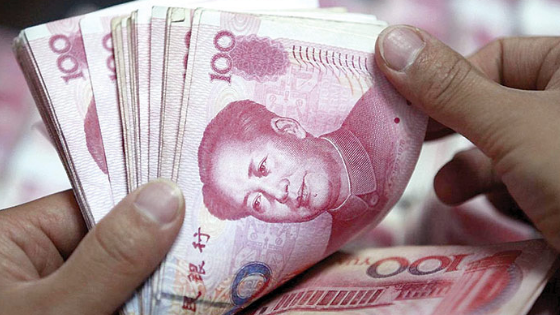Editor’s note: China jawboning the market to prevent yuan depreciation. And stating that they will shift to domestic consumption, which is what the US wants, rather than their reliance on US consumption for growth. Of course you can never take CCP statements at face value.
BEIJING (Reuters) – China’s banking and insurance regulator said on Saturday it did not expect a persistent decline in the yuan and warned speculative short sellers they would suffer “heavy losses” if they bet against the currency.
[Yawen Chen | May 25, 2019 | Reuters]
The yuan has lost more than 2.5% against the dollar since the festering China-U.S. trade dispute intensified earlier this month. It is now less than a tenth of a yuan away from the 7-per-dollar level authorities have in the past indicated as a floor.
“Short-term fluctuation of the yuan exchange rate is normal, but in the long-run, China’s economic fundamentals determine that the yuan will not depreciate persistently,” Xiao Yuanqi, the spokesman for the China Banking and Insurance Regulatory Commission (CBIRC), told a finance forum in Beijing.
“Those who speculate and short the yuan will for sure suffer heavy loss.”
Xiao was reading from a script prepared for Guo Shuqing, CBIRC’s chairman and the Communist Party chief of the People’s Bank of China (PBOC). Guo was scheduled to give a speech at the same forum but couldn’t make it due to last-minute arrangements.
Sources have told Reuters China’s central bank will use foreign exchange intervention and monetary policy tools to stop the yuan weakening past the key 7-per-dollar level in the near-term.
A defence of the 7 level could help boost confidence in the currency and soothe investor fears about the yuan, even as souring trade relations with Washington make competitive devaluation a compelling option for Beijing.
Xiao also said Beijing must look out for hot money moving in and out of the country, as well as large amounts of capital flowing into the frothy real estate market.
“We must be especially vigilant about money from overseas moving in and out in large quantities, and hot speculative money, and we must resolutely fight bubbles in real estate and financial assets,” he said.
Chinese policymakers have struggled to manage bubble risks in the property market, the world’s largest, without hurting growth in the sector, which is crucial for the wider economy.
‘LIMITED IMPACT’
With talks stalled between Washington and Beijing, and U.S President Donald Trump threatening to slap tariffs of up to 25% on all Chinese imports, investors are nervously reassessing risks amid growing fears about their damaging impact on the global economy.
Washington slapped higher tariffs on $200 billion (£157.3 billion) in Chinese goods earlier in May, prompting Beijing to retaliate.
But Xiao said the impact of additional U.S. tariffs on China’s economy, the world’s second-largest, would be “very limited” even if the tariffs were levied “to their extreme level”.
“First of all, most of the (Chinese) products exported to the United States are very suitable for domestic sales. China is in the middle of a ‘consumption upgrade’, so a huge market with rapid expansion will absorb a large amount of them without ‘crowding out’ existing consumers,” he said.
Besides China’s vast consumer market, he also cited U.S. importers’ willingness to share additional costs, and Beijing’s Belt and Road initiative that helps promote trade and investment with the rest of Asia, Europe and beyond as factors that would help cushion any negative shocks.
Xiao added he expected further pressure on China’s financial market to be “not too big” as it has become more resilient after suffering an “over correction” last year.
The United States has recently also ratcheted up tensions with China on the tech front by effectively banning U.S. firms from doing business with Huawei Technologies Co Ltd, the world’s largest telecom network gear maker.
Xiao said China was not surprised at such moves, but stressed they would not prevent China from pursuing its own development while some U.S. tech firms are set to suffer lower revenues from such restrictive state policies.
“History has long proved and will continue to prove that sanctions and blockades will not prevent a country’s technology and economic development,” he said.
“Instead, they will inspire its independent research and development and accelerate its own technological progress.”
Reporting by Cheng Leng, Yawen Chen and Ryan Woo; Writing by Yawen Chen; Editing by Sam Holmes and Nick Macfie
Read the original article here.













